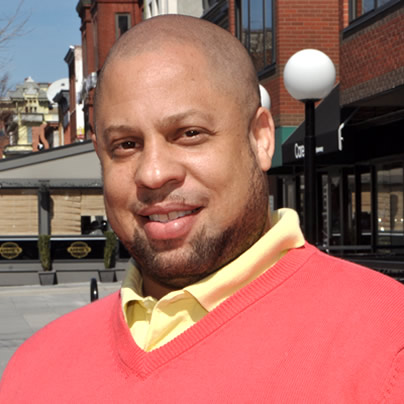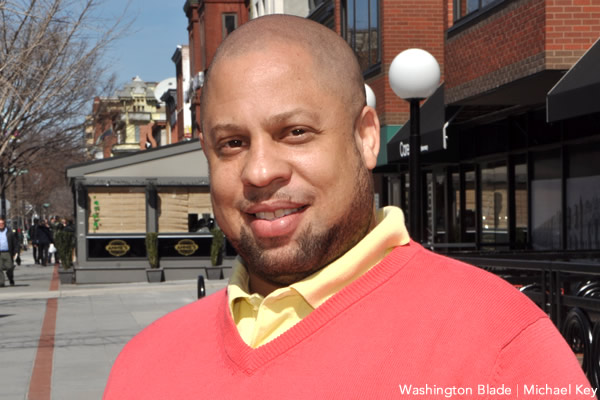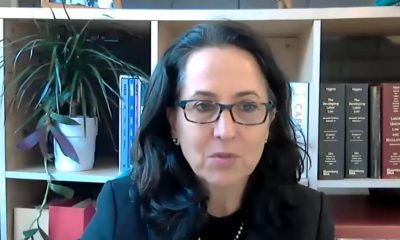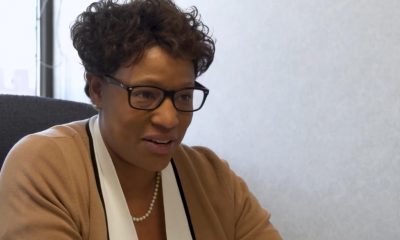World
Jamaican gay rights advocate visits D.C.
J-FLAG Executive Director Dane Lewis attended mixer at Larry’s Lounge in Dupont Circle.

Dane Lewis, executive director of Jamaica Forum for Lesbians, All-Sexuals and Gays, was visiting a gay friend in Kingston, the country’s capital, on a Sunday night in the late 1990s when a group of men slashed three of his car’s tires.
A mob had already formed when he told his friends who were inside the house that they needed to leave. The men eventually stoned Lewis’ car — and a friend who was sitting in the backseat still has shards of glass in his arm after they broke a window.
“We took a girlfriend with us, which we thought would have been a good cover, but that clearly didn’t work,” Lewis told the Washington Blade on Sunday before he attended a D.C. Center-organized mixer at Larry’s Lounge in Dupont Circle. “The community already had an issue with the guy that we went to see and obviously reacted because he had friends that the others thought were gay coming to visit.”
Lewis, who has been with J-FLAG since Feb. 2008, spoke with the Blade roughly two months after he appeared in a public awareness campaign designed to promote greater acceptance of LGBT Jamaicans.
He said reaction to the “We Are Jamaicans” campaign has been “thankfully very positive,” but he has received some negative feedback. This includes a threatening note left on his car outside his Kingston home that read “Batty man for dead” or “Gay man should be murdered” in Jamaican slang.
“We are claiming space in a way that they think we really should keep our lives private and behind closed doors,” Lewis said. “That sadly has been just the way that LGBT people are expected to play to survive in a culture like ours. They would obviously find it offensive that people are being so comfortable with their orientation and the need to speak openly about their realities.”
J-FLAG has faced a number of challenges since its 1998 founding.
A man stabbed Brian Williamson, the organization’s co-founder, to death inside his Kingston home in 2004. Former J-FLAG executive director Gareth Henry sought asylum in Canada in 2008 after he received death threats.
A J-FLAG report said the organization knows of at least 30 gay men who have been murdered in Jamaica between 1997 and 2004. Authorities found honorary British consul John Terry strangled to death inside his home near Montego Bay in 2009 — they found a note left next to his body that referred to him as “batty boy.”
The State Department, Human Rights Watch and other groups have criticized the Jamaican government for not doing enough to curb anti-LGBT violence on the island. J-FLAG is among the organizations that have blasted Buju Banton, Elephant Man, Sizzla and other reggae and dancehall for lyrics they contend incite anti-gay violence.
In spite of these challenges, Lewis notes the country’s LGBT rights movement has seen some advances in recent years.
Jamaican singer Diana King came out as a lesbian last summer in a post to her Facebook page. Beenie Man in the same year apologized for his anti-gay song lyrics.
Prime Minister Portia Simpson said shortly before her Dec. 2011 election her government would review the country’s anti-sodomy law. It has yet to do so, but the Jamaica Supreme Court in June will hear a case that challenges the colonial-era statute on grounds it violates a constitutionally-guaranteed right to privacy.
“It will be a very interesting case to watch,” Lewis said. “It will give a better sense of where the courts are at in terms of protecting the rights of gay, lesbian, bisexual and transgender people.”
Lewis spoke with the Blade a day before Queen Elizabeth II signed a Commonwealth charter with an anti-discrimination statement that reportedly includes an implicit reference to gay men and lesbians. He said President Obama’s statements in support of LGBT rights and same-sex marriage have had a positive effect in Jamaica.
“What it has done has opened up a debate for us around the issue of rights and whether same-sex marriage needs to be on the table,” Lewis said.
Lewis remains optimistic this progress will continue in the years to come.
Health Minister Dr. Fenton Ferguson in December said lawmakers should repeal the country’s anti-sodomy law. A January sexuality symposium included LGBT-specific information, but a recent J-FLAG report found only 17 percent of Jamaicans tolerate gay men and lesbians.
A video showing a mob at a Jamaican university attacking a student whom they reportedly caught in a “compromising position” with another man in a bathroom went viral last November. The clip captures two security officers beating the man while the crowd calls him “batty boy.”
J-FLAG statistics note one third of Jamaicans feel the government has not done enough to protect their LGBT countrymen. Lewis said the Nov. 2012 incident and others like it help “generate the conversation” about gay and lesbian rights in the country.
“We need to capitalize on that energy and begin to have some public discourse,” he said.

The Mexican Senate on Thursday approved a bill that would ban so-called conversion therapy in the country.
Yaaj México, a Mexican LGBTQ rights group, on X noted the measure passed by a 77-4 vote margin with 15 abstentions. The Chamber of Deputies, the lower house of Mexico’s congress, approved the bill last month that, among other things, would subject conversion therapy practitioners to between two and six years in prison and fines.
The Senate on its X account described conversion therapy as “practices that have incentivized the violation of human rights of the LGBTTTIQ+ community.”
“The Senate moved (to) sanction therapies that impede or annul a person’s orientation or gender identity,” it said. “There are aggravating factors when the practices are done to minors, older adults and people with disabilities.”
Mexico City and the states of Oaxaca, Quintana Roo, Jalisco and Sonora are among the Mexican jurisdictions that have banned the discredited practice.
The Senate in 2022 passed a conversion therapy ban bill, but the House of Deputies did not approve it. It is not immediately clear whether President Andrés Manuel López Obrador supports the ban.
Canada, Brazil, Belgium, Germany, France, and New Zealand are among the countries that ban conversion therapy. Virginia, California, and D.C. are among the U.S. jurisdictions that prohibit the practice for minors.
South America
Argentina government dismisses transgender public sector employees
Country’s Trans Labor Quota Law enacted in 2021

Protests have broken out across Argentina in recent weeks after the dismissal of transgender people from their government jobs.
President Javier Milei’s action is in stark contract with the progress seen in 2023, where the government’s hiring of trans people increased by 900 percent within the framework of the Trans Labor Quota Law that had been in place since 2021.
Among those affected is Sofia Diaz, a “survivor” who shared her testimony with the Washington Blade hours after she traveled from Chaco Province to Buenos Aires to protest her dismissal.
Presentes, an LGBTQ news agency, reported the government dismissed more than 85 trans employees in less than two weeks.
Diaz, 49, holds a degree in combined arts. She joined the National Social Security Administration (ANSES) in 2022 under the Trans Labor Inclusion Law. The layoffs began in January and left many people feeling uncertain and anguished. It was her turn a few days ago.
Diaz in an interview recounted how the situation became progressively more complicated, with difficulties in accessing information about her employment status and the eventual confirmation of dismissals through WhatsApp messages. This government action, according to Diaz, violates the law.
“We were on a Friday, I think on March 24, in the office and we have a WhatsApp group of other colleagues from all over Argentina who entered through the trans labor quota and they tell us if we can get our pay stubs on the intranet,” Diaz recalled. “So, I tried to enter, I could not, I talked to two other colleagues and they told me no, they could not, and so we went to another person. He couldn’t either.”
“Some people told us that it could be a system error. Well, we were never calm, let’s say not how this issue of installing fear and the perversion with which they do it ends,” she added. “This sadism of … inflicting pain and speculating with your misfortune and so on … is something that characterizes Javier Milei’s government.”
Diaz recalled a list of those dismissed from the agency began to circulate from the union in the afternoon. A colleague passed it on to her, “and well, unfortunately I was also on that list.”
“At that moment the whole weekend went by with anguish, crying, and talking with other colleagues from other places, not only trans, but everyone, everyone and everyone,” she said. “On Monday when we went to try to enter, we could not enter with the biometric, which is the thumb we had to use every morning to enter.”
Despite the difficult moment through which she is going, the trans activist stressed to the Blade that she will continue protesting and will even sue the government because her dismissal is illegal and “violates the constitution itself.”
The LGBTQ community and its allies have mobilized and organized demonstrations, highlighting the importance of defending the rights won and fighting against discrimination and exclusion. Diaz emphasized the fight is not only for the people affected today, but also for future generations, saying the historical memory of the struggles for inclusion and social justice must be kept alive.
“The Argentine government thus faces a key challenge in human and labor rights, where public pressure and social mobilization can play a determining role in protecting the rights of LGBTQ+ people,” Diaz said.
Africa
For queer Nigerians, being on gay dating apps is still a risk
Homophobes target users for violence

Gay hookup apps like Grindr, and dating apps like Tinder and Bumble have managed to proliferate queer communities in countries like Nigeria.
Those who seek one night stands find what they want while those looking for love equally find what they seek. These platforms have managed to position themselves as safe spaces for queer people in anti-gay Nigeria. In recent times, however, it is proving to be unsafe, as homophobic people are quickly learning about the apps, and opening accounts that either seek to outrightly threaten queer people, or pretend to be queer, have long chats with gay people, invite them over, and inflict violence on them.
Take the case of Biodun, a queer Nigerian man who joined Grindr to meet up with guys like him.
After Biodun had built a connection and agreed to meet with someone whose display name was “Mamba,” they decided to meet up only for him to be met with violence. Apparently, Mamba ran a catfish account.
“I’ll never forget that day,” Biodun, who asked the Washington Blade not to use his last name because of safety concerns, said. “I still think about it, and sometimes blame myself for being very careless, even though Grindr was supposed to be our safe space.”
Biodun’s experience isn’t peculiar to him.
In Nigeria, draconian laws that criminalize same-sex relationships exist, making queer people turn to the digital realm to explore their identities and seek connections beyond the confines of societal oppression that comes with the physical environment. Gay dating apps such as Grindr, therefore, have emerged as virtual sanctuaries, offering spaces for queer Nigerians to forge friendships, find solidarity, and pursue romantic or sexual relationships. Spaces like this, however, have morphed into a landscape fraught with danger, as homophobic people have weaponized these platforms to perpetuate hate and violence.
“Sometimes, I often wonder how they learned about these platforms,” Daniel, which is not his real name, told the Blade. “You would think that it is just us in the platforms, until you find out that the accounts are rooted in homophobia.”
One time, someone’s bio read, “I’m only here to deal with the gay people. I know all of you, and I will find and kill you. We no want una for here (translates to we do not want you here, in English.)” It was a stark reminder that these spaces are no longer LGBTQ-friendly for Nigerians. In 2014, there was the passage of the Same-Sex Marriage Prohibition Act by former President Goodluck Jonathan, which not only criminalized same-sex unions, but also imposed severe penalties on anyone involved in LGBTQ advocacy or support.
This law catalyzed a surge in discrimination and violence against queer Nigerians; emboldening regular civilians, religious extremists, and even law enforcement agencies to target individuals perceived as deviating from traditional gender and sexual norms. Again, amid this hostile environment, gay dating apps emerged as lifelines for many queer Nigerians, offering avenues for discreet communication, community building, and the pursuit of intimate relationships.
The very anonymity and freedom these apps provided, however, became double-edged swords.
The advent of screenshot and screen-recording capabilities on these apps, for example, reduced the risks of exposure, strengthening the safety and privacy of users. However, this also comes with its own lapses, as queer people using Grindr have often relied on screenshots and screen recordings to confirm the identities of potentials with their friends, before accepting to meet.
“Before the removal of the screenshot option, I usually shared photos of others with my trusted friends,” Biodun shared. “But since that was taken off, there was no way for me to do that.”
Although, according to Grindr’s terms and conditions, the removal came with privacy concerns, as it was to facilitate a safe dating experience.
This erosion of digital safe spaces is depriving queer Nigerians of vital avenues for self-expression and affirmation,and is exacerbating the psychological toll of living in a society that continues to systematically demonize their identities. Moreover, the normalization of homophobic rhetoric and violence in both physical and digital realms has perpetuated a cycle of fear and oppression, and is reinforcing this notion that LGBTQ individuals are inherently unworthy of dignity and respect. Despite these challenges, though, the resilience of queer Nigerians continue to persist, as they defy societal norms and assert their right to love and be loved.
-

 State Department4 days ago
State Department4 days agoState Department releases annual human rights report
-

 South America2 days ago
South America2 days agoArgentina government dismisses transgender public sector employees
-

 District of Columbia2 days ago
District of Columbia2 days agoCatching up with the asexuals and aromantics of D.C.
-

 Politics5 days ago
Politics5 days agoSmithsonian staff concerned about future of LGBTQ programming amid GOP scrutiny













